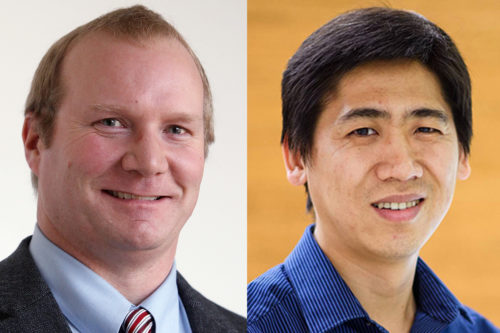By Molly A. Seltzer

The Alfred P. Sloan Foundation has awarded Mark Zondlo, associate professor of civil and environmental engineering, and Z. Jason Ren, professor of civil and environmental engineering and the Andlinger Center for Energy and the Environment, a three-year, $1.5 million award to study emissions from an unlikely place: wastewater.
Zondlo and Ren will measure a suite of greenhouse gases and air pollutants at wastewater treatment plants and dairy farms. From 2005-2017, wastewater treatment was the fastest growing sector for nitrous oxide emissions, a long-lived greenhouse gas that lasts a century in the atmosphere. At the same time, manure management was the fastest increasing sector for methane emissions, a potent greenhouse gas. Both sectors emit ammonia, a critical air pollutant that forms unhealthy particles, but a gas with poorly constrained estimates. Despite increasing emissions of these gases from wastewater, there is little scientific consensus on their magnitudes or geographic distribution. The researchers aim to provide insights both on the geographic origins of these these emissions, and insights on how they may be remedied. By combining mobile laboratory-derived emissions rates with process-level drivers, the researchers plan to identify effective pathways for emissions mitigation and resource recovery from the waste streams. The researchers, collaborating with Francesca M. Hopkins, an assistant professor of climate change and sustainability in the Department of Environmental Sciences at University of California, Riverside, will conduct a field study of wastewater treatment plants and dairy farms throughout California and the Northeastern United States. Zondlo will employ the Princeton Atmospheric Chemistry Experiment (PACE), a mobile laboratory equipped with a suite of custom, laser-based sensors, to sample a large number of sites to discern site-to-site variabilities of emissions to the atmosphere. At select ‘supersites,’ Ren will apply his expertise in wastewater treatment to quantify emissions from the process level by monitoring water quality in terms of carbon, nitrogen, and other contaminant removals. Hopkins will also deploy her group’s mobile laboratory at these sites to provide additional trace gas measurements for a more comprehensive understanding of the processes that lead to their emissions.
Zondlo and Ren received seed funding from the Princeton Environmental Institute (PEI) Water Grand Challenges program, which enabled them to collect preliminary data for the proposal. The team also includes Ashwin Dhanasekar, a research manager at the Water Research Foundation, and stakeholders at the California Air Resources Board and the Bay Area Air Quality Management District.
The research by Zondlo, Ren, and Hopkins is being funded through the Alfred P. Sloan Foundation’s, Energy and Environment program, which makes grants to advance understanding about the economic, environmental, security, and policy trade-offs associated with the increased deployment of low- and no-carbon resources and technologies across the energy system.
See related research below:
On the road in Hawaii, Princeton team seeks clearer picture of volcanic air quality
Researchers use sunlight to pull hydrogen from wastewater